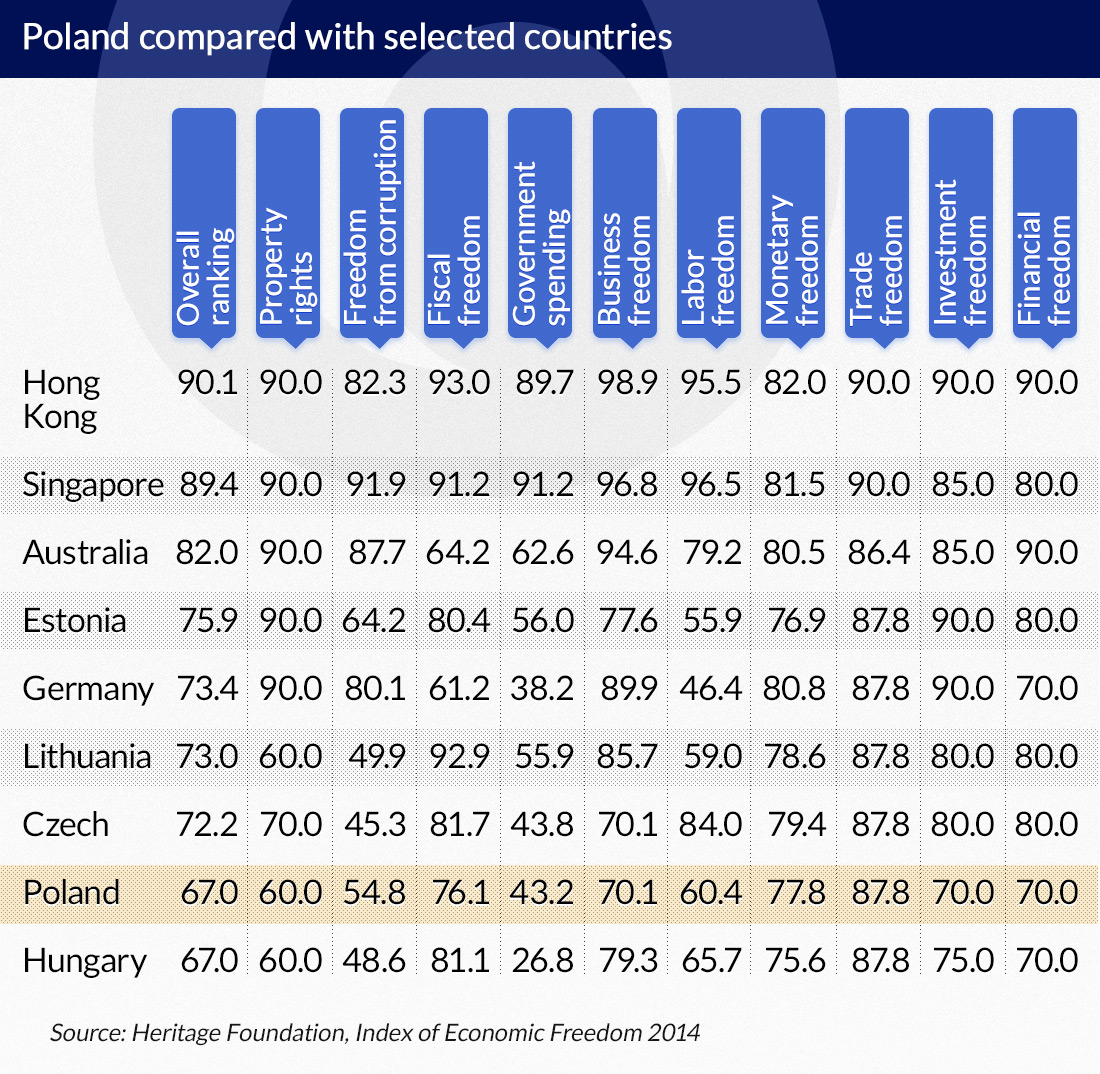Tydzień w gospodarce
Category: Trendy gospodarcze

Infographics DG/OF
Conducted over the last 20 years by the Heritage Foundation and WSJ, the research is based on a 0 to 100 point scale. The closer a country is to 100, the freer its economy. Poland has a ‘moderately free’ economy, with an overall score of 67. It was ranked 50th out of the 186 countries ranked and 23rd out of the 43 countries of Europe. Compared to last year, improvements have been made in:
The labor market has changed for the worse, however.
Throughout the lifespan of the ranking carried out by Heritage, the Polish economy has gained 16 points, which is one of the 20 best results. It has been placed in the middling category of ‘moderately free economies’ since 2002.
But is there anything to boast about?
“Being ranked 23rd in Europe is not a cause for pride. Everyone in our region ranks higher: the Czech Republic, Estonia, Lithuania and even Georgia. We have the same result as Hungary, which went through a dramatic budgetary situation,” Mariusz Pawlak, from the Association of Entrepreneurs and Employers, comments.
Other experts point out that only politicians and publicists look at the general national result. Investors concentrate much more on the potential consequences for their companies or planned undertakings.
Deloitte Poland management board member Rafał Antczak illustrates the problems investors face, which remain unaffected by Poland’s jump a few places up a long list.
“So what if the procedure involved in attaining building permits has improved – something which bounced Poland up significantly in the Doing Business poll – when we are still in 137th place globally with regard to procedures involved in getting plugged into the power grid. Investors read such research in detail and think; maybe it will be easier to build a warehouse in Poland but what’s the point if it won’t be able to get electricity,” Antczak muses.
“These polls have no greater sense. It is often the case that a country advances by a few places only because other countries have declined, or because officials have learnt to write better reports, which are used as data to create these rankings,” mBank’s Chief Economist, Ernest Pytlarczyk, adds.
According to Rafał Antczak, investors will analyze the long-term implications of changes in a country’s position on such lists.
“I would not cancel out these rankings completely. The changes they present are definitely worth a look. If a country is advancing spectacularly, then investors look at what is behind this tendency and whether it can be upheld. This is because they are interested in the future, and this is why Poland, which has been in the middle group for years, doesn’t invite much attention,” Antczak comments.
Poland’s result in individual categories is very uneven. It is in 11th place in terms of free trade. This is thanks to the European Union’s regulations covering this issue. The EU eliminates taxes and many other barriers between member states. Poland is in 19th place in terms of financial freedom, and in 41st place in terms of the level of corruption.
Poland has advanced most in the category that deals with the conditions under which businesses are run. This is mainly thanks to a jump by 10 places in a separate report by the World Bank, on which the Heritage Foundation’s reports are partly based, entitled “Doing Business 2014.” The authors of the World Bank report also highlighted the positive effect of the deregulation of 50 occupations in Poland. On the other hand, the labor market is not as flexible as in neighboring countries, and an initiative proposed by the PM to put fees on civil-law contracts could make the result worse next year.
Poland’s worst result is for public sector spending where it holds 145th place, and for fiscal policies, where it stands at 114. The situation is slowly improving in both cases. During the Polish presentation of the report, Aleksander Łaszek, from the Civil Development Forum, admitted that public spending has recently declined in relation to GDP. Marcin Chludziński of the Republican Foundation explained that the problem does not lie with high taxes but with the ambiguity of the law and stubborn verification methods.
Rafał Antczak is of a different opinion. He thinks that lower taxes are essential for Poland. A change in the rankings in this sector would bean argument that could really convince investors.
“Lower state spending is a prerequisite to this. OECD countries, which are wealthy today, spent a lot less than Poland when they were in its current place. What follows; they were not forced to impose such high taxes. Investments were automatically higher in these countries,” Antczak writes.



